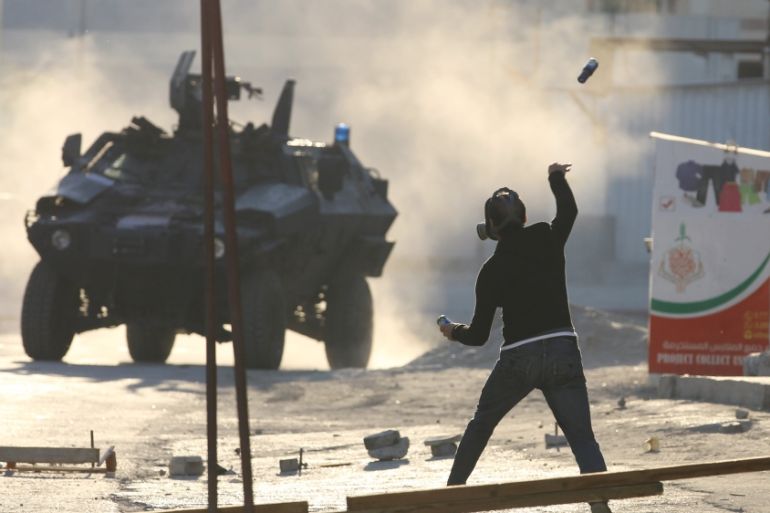Was Bahrain’s uprising worth it?
On the fifth anniversary of the 2011 uprising, two Bahrainis offer their take on the country’s past and future.

An ongoing dream for change
Human rights activist Sayed Ahmed Alwadaei , the director of advocacy at the Bahrain Institute for Rights and Democracy, was jailed for six months in Bahrain for participating in pro-democracy protests. He later sought asylum in the United Kingdom.
![Sayed Ahmed Alwadaei [Al Jazeera]](/wp-content/uploads/2016/02/2802d010847a4694820b5d6d047d3181_19.jpeg)
I joined the protests because they gave us hope. When we saw Tunisia and Egypt achieve their revolutions, we decided to have our own day of rage. We started the largest popular uprising in all of Bahrain’s history.
Keep reading
list of 4 itemsUS sanctions two RSF commanders as fighting escalates in Sudan’s Darfur
The Lost Souls of Syria – Part 1
Is the US shipping weapons to Israel tacit support for its war on Gaza?
It was a fight against injustice, discrimination and corruption. We wanted to turn a new page, where all citizens were equally respected and had their dignity, and had a say in the governance of their nation and destiny. We wanted a share of the wealth and opportunity.
What motivated me the most was my own bleak future. It was not only about getting a job; it was about being treated as an equal citizen. In May 2010, I returned to Bahrain after completing my electronics engineering degree and fulfilling two years of experience at British firms. I began to see problems everywhere.
I was struck by the sight of police officers wearing Bahraini uniforms, struggling to speak Arabic, and felt insulted that with so many unemployed in the country, we were importing people from outside Bahrain.
The state has kicked sand over the embers, but the embers are still burning.
I protested on February 14, the very first day of protests, and saw how police attacked us. We were peaceful protesters. We held nothing except Bahraini flags and chanted pro-democracy slogans. They threw tear gas at us. That night, I went to Salmaniya hospital and witnessed the state’s crimes. There were so many wounded protesters. It was overwhelming to see how my own people were being treated by our government.
I attended a funeral the next day. It was the bravest protest I ever saw. People chanted freely. They were so angry. There was no fear.
The determination and aspirations of the people remain today, but in the five years since the uprising, the government has created a state of fear by arresting, jailing and torturing opposition leaders. The state has kicked sand over the embers, but the embers are still burning.
I went through beatings, arrest, torture and unfair trial in Bahrain. They tried to take my dignity with these acts. I left Bahrain into exile with nothing but my citizenship, and last year they took that from me. But this has only given me strength, and made me more determined to create change.
The revolution was a fraud
Bahraini journalist and politician Adnan Bumetea believes that the country’s uprising was not a revolution, but rather an attempted coup against the royal family.
![Adnan Bumetea [Al Jazeera]](/wp-content/uploads/2016/02/ba7bcee2c03f47a8aaa9c9c624b5712f_19.jpeg)
The 2011 uprising in Bahrain was merely part of a sectarian coup movement against the ruling family, conducted in coordination with Iranian secret intelligence. It promoted vandalism, roadblocks and organised assaults on security officers, along with civil disobedience, in parallel with the withdrawal of Shia parliamentarians from the elected parliament and from the consultative council, in an attempt to suggest that most Bahrainis approved of this movement.
During the uprising, significant efforts were made by local, regional and international media to portray the demonstrations in Bahrain as a vast public movement that encompassed various groups and segments in Bahraini society. But this was absolutely contrary to the truth. It was not a revolution, but rather a planned coup.
With the rapid escalation of events, resulting in numerous civil confrontations in the streets of Bahrain, various patriotic parties rushed to unite in a public front to uphold the regime and to defend the existence of the nation. The escalation required the Bahraini government to further assure its security by seeking assistance from other countries in the Gulf Cooperation Council, which instantly responded and rushed to send troops to save Bahrain from imminent civil destruction.
The future of Bahrain is dependent on... severing all forms of malignant foreign intervention.
In spite of the judicial decrees against the groups that have plotted the coup and other acts of sedition, violence remained persistent, to project an image of Bahrain as destabilised. Such acts of violence continue until today.
The Iranian-backed sectarian movements in Bahrain have obstructed the march of political reforms and have tremendously affected economic growth, as actors involved in the coup refused to participate in the legislative elections held in 2014, in an attempt to create further obstacles towards any real democratic transition.
The future of Bahrain is dependent on normalising the current situation and severing all forms of malignant foreign intervention, especially Iranian intervention. Paying full attention to the principles of citizenship that would produce patriotic generations, and rejecting all forms of intervention against the interests of the nation, is equally paramount.
It is also crucially important to eradicate the corruption in Bahraini society and government institutions to produce an effective political environment that is based on transparency, international human rights and social justice.